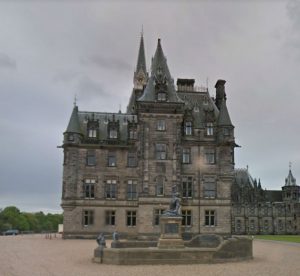A CHARITY is trying to shake up private education in Scotland by offering “no frills” schooling for £52 a week.
Bill Nicol of the Schools Education Trust (SET) claims the £2,700-a-year fees will provide a “high-quality” alternative to the Scottish education “blob”.
The planned fees are as little as a tenth of what Scotland’s most prestigious private schools currently charge.
Mr Nicol, director of the New Lanark-based organisation previously attempted to introduce free schools to Scotland.
He will formally launch the new venture – billed as “Improving the Quality of School Education in Scotland” – at an event at the Radisson Blu hotel, Edinburgh, on November 8.

Costs would be kept down by a central support system which Mr Nicol claims is more efficient than local authorities, and with a focus on improving performance.
The charity’s plan to challenge the “dearth of innovation” in the Scottish education system will start with a small “egalitarian” school in Edinburgh.
Joining would not be based on ability to pay, but instead using a means-tested voucher system. The plans are inspired by a school in Durham which is yet to open but promises a £52-a-week private education.
Parents opting out of the state sector face big – and rapidly increasing – fees for private schools.
Fettes College in Edinburgh costs £26,790 a year, St Columbas school in Glasgow is £10,920 a year, yearly fees at The High School of Dundee are £12,498 while the International School of Aberdeen will set you back £19, 820 a year.
Mr Nicol said: “The SET would be solely focused on improving educational attainment through high quality, no-frills education with added benefits and innovations for half the cost.
“Why would you continue to fund the state system if you can provide a product that is competitive in the market, that’s got better outcomes and costs less?”
He added that many teachers that he had spoken to “love this model” but conceded that teaching unions were certain to be against it.
“By and large, the unions are there to protect hopeless teachers”, he claimed.
Mr Nicol also labelled Scottish state education a “blob” and that a “natural consequence”, if his system was successful, would an end of schools run by local authorities.
The launch event will be chaired by former CBI director Lord Digby Jones and he will be joined by James Tooley, a professor at Newcastle University who is behind the plans for the low cost school in Durham.
Conservative education spokeswoman Liz Smith has backed the plans, saying: “We should be doing all we can to support this progressive Scottish registered charity.”
But James McEnaney, a further education lecturer and former schoolteacher, was a leading critic of the previous proposals and believes the new ones are based on the same “vague platitudes” and “hollow, ideological assumptions.”
He said: “This looks like little more than a front for the discredited – and rejected – work of the Hometown Foundation, whose failed proposals for the Scottish free schools system have, thankfully been rejected by the Scottish government.
“It is founded upon the same vague platitudes and hollow, ideological assumptions.”
John Edward, director of the Scottish Council of Independent Schools, said that they were neither for nor against the proposals, but added: “There is plenty of space in the educational firmament.
“I don’t see it necessarily taking any pupils off the existing schools.”
A spokesman for the Scottish Secondary Teachers’ Association (SSTA) said: Teachers unions are not there to protect poor teachers, we don’t want them there either.
“If teachers are not performing or not in the right career, we as unions do them the best favour by saying ‘Is this really for you?’
“If there is failing, there are procedures and we support them through that.
“But if we’re having to deal with poor teachers it takes up time and prevents us from doing the other parts of the job, so obviously it’s not in our interests.
“Unions do a marvellous job and it’s not about supporting poor teachers it’s about providing for children.
“These people (SET) have got their own agenda and it’s not for young people, they want their own schools for their own children without qualified teachers. There are schools in England without qualified teachers and it’s not the best situation for anyone.
“I’d have thought they’d have grown up and moved on by now. I think they need to realise this is not something the public in Scotland actually wants and go away.”
A Scottish Government spokesperson said: “The Government recognises that the independent sector is a well-established part of Scotland’s education system and offers another option to parents.
“In accordance with the legislative requirements set out in the Education Scotland Act 1980, all independent schools require to be registered with Scottish Ministers.”
